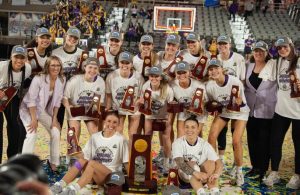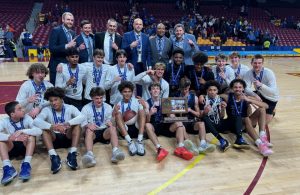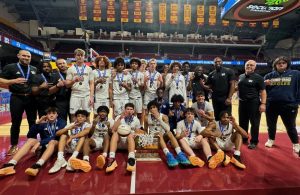-
Final
McGregor
Silver Bay67
32 -
Final
Luverne
Hermantown2
1 -
Final
Wabasha
Floodwood2
0 -
Final
Blackduck
Floodwood2
8 -
Final
Floodwood
NY Mills5
6 -
Final
K-M
Hermantown4
1 -
Final
F. Lake
Gr-Rapids4
3 -
Final
I. Falls
Hermantown3
8 -
Final
I- Falls
Hermantown2
0 -
Final
Carlton
Floodwood0
3 -
Final
Gr-Rapids
N-Branch4
0 -
Final
ElkRiver
Gr-Rapids0
2 -
Final
Cloquet
I. Falls4
7 -
Final 5 inn
Chisholm
Carlton2
12 -
Final
Chisholm
Floodwood2
8 -
Final
Hermantown
Cloquet2
0 -
Final 10-Inn
I- Falls
Proctor1
0 -
Final
Carlton
Marshall1
0
-
3-6-14
Barnum
Esko0
0 -
Final
Hermantown
Cloquet60
71 -
Final
RushCity
Barnum42
78 -
Final
Cloquet
Ashland40
37 -
final
MLWR
Mora71
79 -
Final
SilverBay
Carlton53
70 -
Final
McGregor
T.Harbors32
70 -
Final
H.Town
Denfeld64
53 -
Final
Rush City
E.Central61
46 -
Final
Marshall
Cherry74
68 -
Final
Cloquet
LCA102
80 -
Final
Barnum
Floodwood67
47 -
Final
Cook Co.
MLWR36
64 -
Final
Barnum
Carlton90
27 -
Final
G.Rapids
Hermantown72
74 -
Final
Floodwood
Esko39
80 -
Final
Eveleth-G
Proctor72
93 -
Final
Marshall
S-Ridge77
91 -
Final
D-East
Denfeld52
60 -
Final
Hermantown
Cloquet65
63 -
Final
D-East
G-Rapid58
69 -
Final
Cromwell
Northland56
61 -
1/16/14
Superior
Ashland0
0 -
Final
MLWR
Rush City62
46 -
Final
Wrenshall
Northeast84
47 -
Final
Barnum
E-Central74
33 -
Final
Floodwood
Cromwell77
35 -
Final
G-Rapid
Denfeld61
52 -
Final
Ashland
Proctor80
61 -
Final
Superior
Hermantown44
67 -
Final
McGregor
Onamia41
71 -
Final
Cloquet
MLWR81
60 -
Final
Esko
Foley73
42 -
Final
Virgina
S-Ridge60
55 -
Final
Hibbing
Proctor64
51 -
Final
Hermantown
Thief68
81 -
Final
Crosby
Marshall74
54 -
Final
Wrenshall
MLWR48
85 -
Final/OT
Floodwood
TwoHarbor52
53 -
Final
Esko
Carlton83
24 -
Final
Bemidji
Denfeld68
80 -
Final
S-Ridge
HillCity68
33 -
Final
Barnum
CookC76
31 -
Final
Cromwell
SilverBay69
34 -
Final
Esko
D-East50
38 -
Final
Cromwell
Lakeview64
78 -
Final
B.O.N.G.S
McGregor59
88 -
Final
Superior
Cloquet46
61 -
Final
Barnum
Denfeld69
51 -
Final
Marshall
Proctor72
64 -
Final
Hermantown
MLWR67
62 -
Final
Floodwood
BigFork39
57 -
Final
D-East
Cloquet55
59 -
Final
TwoHarbor
Proctor64
76 -
Final
Marshall
PineCity46
61 -
Final
Zimmerman
Hermantown58
67 -
Final
MLWR
Cromwell77
57 -
Final
Floodwood
Wrenshall68
67 -
Final
Carlton
McGregor64
48 -
Final
SilverBay
Barnum25
85 -
Final
Denfeld
D-East48
67 -
Final
Lakeview
Ashland46
62 -
Final
Lakeview
Washburn75
90 -
Final
Cloquet
Hibbing76
44 -
Final
TwoHarbor
Carlton61
44 -
Final
Barnum
SouthRidge73
35 -
12/30/13
Superior
Ashland0
0 -
12/19/13
Wrenshall
Lakeview0
0 -
12/19/13
Carlton
St.John0
0 -
12/19/13
Virgina
Esko0
0 -
12/19/13
Superior
Marshall0
0 -
12/19/13
Minn-SW
Cloquet0
0 -
12/19/13
Floodwood
Cherry0
0 -
12/19/13
Barnum
PineCity0
0 -
Final
McGregor
Isle39
65 -
Final
SouthRidge
Wrenshall61
66 -
Final
Proctor
MLWR73
78 -
Final
Denfeld
Esko50
75 -
Final
Cloquet
Hermantown47
45 -
Final
Superior
Chippewa71
78 -
Final
Carlton
Lakeview53
80 -
Final
TwoHarbor
SilverBay65
27 -
Final
Marshall
Mesabi38
58 -
Final
Marshall
Deer River69
64 -
Final
FDL
Cromwell113
47 -
Final
Isle
Floodwood68
78 -
Final
LCA
Proctor70
72 -
Final
Floodwood
Northwood52
49 -
Final
Carlton
Wrenshall26
62 -
Final
Esko
Cromwell81
35 -
Final
Barnum
MLWR74
53 -
Final
TwoHarbor
Crosby49
39 -
Final
Fairbaults
Denfeld59
56 -
Final
N-Branch
Hermantown64
67 -
Final
Cloquet
Proctor93
48 -
Final
MN-Trans
FDL62
96 -
Final
Hermantown
St. Paul52
69 -
Final
Aitkin
MLWR41
83 -
Final
Barnum
Esko33
46 -
Final
Floodwood
Carlton82
40 -
Final
SilverBay
T.Harbors25
67 -
Final
Wrenshall
Cook-Cty52
40 -
Final
Cloquet
G.Rapids51
29 -
Final
west
east14
35
-
Final
Floodwood
Cromwell20
28 -
Final
Princeton
Hermtwn21
22 -
Final
Wrenshall
SouthRidge28
8 -
Final
Barnum
Braham8
28 -
Final
Eve/Gilb
MLWR21
44 -
Final
Dmarsh
Esko12
35 -
Final
Proctor
Two Hrbors12
20 -
Final
Rapids
Cloquet24
44 -
11/16/13
Proctor
St.Croix0
0 -
Final
Delano
Cloquet61
33 -
Final
Pierz
Proctor6
19 -
Final
Minneota
MLWR31
20 -
Final
Floodwood
Ely27
41 -
Final
Cloquet
Hermantown23
14 -
Final
Esko
Proctor21
37 -
Final
Mesabi
MLWR6
62 -
Final
Barnum
Braham20
28 -
Final
SouthRidge
Floodwood20
37 -
Final
Denfeld
Hermantown20
29 -
Final
Princeton
Cloquet6
20 -
Final
TwoHarbor
Proctor12
27 -
Final
Marshall
Esko0
14 -
Final
Eveleth-G
MLWR13
58 -
Final
DeerRiver
Barnum2
44 -
Final
McGregor
Floodwood28
47 -
Final
Wrenshall
SouthRidge6
26 -
Final
D-East
Bemidji6
42 -
Final
Denfeld
Hibbing25
0 -
Final
Greenway
Marshall12
34 -
Final
Walker
Barnum8
46 -
Final
SilverBay
Wrenshall0
31 -
Final
Cromwell
Floodwood0
26 -
Final
Cherry
Floodwood0
34 -
Final
HillCity
McGregor18
29 -
Final
I-Fall
TwoHarbor12
20 -
Final
Virginia
Esko20
51 -
Final
McGregor
HillCity38
34 -
Final
TwoHarbor
Deer River21
7 -
Final
SilverBay
SouthRidge6
48 -
Final
Nevis
Cromwell14
0 -
Final\
Wrenshall
Kelliner22
28 -
FInal
LOTW
Floodwood6
42 -
FINAL
RushCity
Esko6
43 -
Final
Northland
Carlton30
18 -
Final
CookC
Barnum16
48 -
Final
Cloquet
PineCity56
3 -
Final
Denfeld
Monticello18
49 -
Final
Marshall
MLWR0
22 -
Final
Hermantown
Virginia57
0 -
Final
Proctor
Hibbing26
16 -
Final
Eveleth-G
Esko28
52 -
Final
Floodwood
Isle13
33 -
Final
Barnum
Ogilive48
12 -
Final
MLWR
TwoHarbor0
0 -
Final
Cromwell
Wrenshall14
17 -
Final
Carlton
McGregor6
50 -
Final
Aiktin
Hermantown12
32 -
Final
Menomine
Superior12
35 -
Final
Cloquet
Proctor17
10 -
Final
D-East
Denfeld12
56 -
Final
DeerRiver
Marshall7
41 -
Final
Isle
Cromwell15
20 -
Final
McGregor
Floodwood8
48 -
Final
Braham
Barnum28
6 -
Final
DeerRiver
MLWR0
45 -
Final
Carlton
Wrenshall0
55 -
Final
Greenway
Hermantown0
44 -
Final
Esko
Proctor20
22 -
Final
Denfeld
BigLake12
34 -
Final
Superior
Hudson18
35 -
Final
TwoHarbor
Marshall0
12 -
Final
Cloquet
Virginia55
0 -
Final
Cromwell
McGregor41
44 -
Final
Greenway
MLWR14
56 -
9/27/13
Wrenshall
Isle0
0 -
Final
Floodwood
Carlton12
34 -
Final
Hermantown
I-Fall39
26 -
Final
Virginia
Proctor0
37 -
Final
Superior
ECN35
31 -
Final
Hibbing
Cloquet6
42 -
Final-OT
Marshall
EastCent20
14 -
Fina
Mesabi E
Barnum8
36 -
Final
Two-Harb
Esko14
28 -
Final
Ely
SouthRidge24
12 -
Final
Cherry
SilverBay12
57 -
Final
Floodwood
Cromwell49
7 -
Final
Barnum
Hinckley62
28 -
Final
TwoHarbor
I-Fall30
28 -
Final
DeerRiver
CookC38
16 -
Final
MLWR
Eveleth55
15 -
Final
McGregor
Wrenshall22
27 -
Final
Carlton
Isle0
41 -
Final
Proctor
Greenway36
20 -
Final
Hermantown
Cloquet21
15 -
Final
RiceLake
Superior20
27 -
FinaL
NorthB
Denfeld26
14 -
Final
Esko
Marshall33
28 -
Final
Hibbing
Hermantown12
41 -
9/13/13
Superior
RiverFall0
0 -
Final
Denfeld
Princeton22
53 -
Final
Proctor
I-Fall17
14 -
Final
Cloquet
Greenway47
20 -
Final
PineCity
MLWR8
43 -
Final
Ogilive
TwoHarbor6
48 -
Final
Isle
McGregor20
24 -
Final
Wrenshall
Floodwood2
18 -
Final
Esko
Deer River54
19 -
Final
E-Central
CookC20
0 -
Final
Cromwell
Carlton29
6 -
Final
Crosby
Barnum12
38 -
Final
Marshall
Eveleth35
15 -
Final
St.Cloud
Marshall5
2 -
Final
Cromwell
LOTW27
6 -
Final
Floodwood
Northland48
6 -
Final
Barnum
EastCentral28
0 -
Final
Eveleth
TwoHarbors25
52 -
Final
Hinckley
C-Country21
8 -
Final
McGregor
Onamia46
16 -
Final
ML/WR
Esko8
6 -
Final
Hill City
Wrenshall30
7 -
Final
Carlton
Nevis0
52 -
Final
Chisago
Denfeld41
18 -
Final
Proctor
Hermantown0
22 -
9-6-13
Eau Clarie
Superior0
0 -
Final
I-Falls
Cloquet12
46 -
9-6-13
Marshall
Ogilive25
14 -
Final
Pine City
Proctor12
28 -
8-30-13 Boys
Superior
Ashland0
0 -
Final
CookCountry
Marshall16
41 -
Final
McGregor
Kelliher16
56 -
Final
Esko
Cloquet18
19 -
Final
Cherry
Chisholm
28 -
Final
E.Central
Hinckley14
7 -
Final
Denfeld
Cambridge0
34 -
Final
Barnum
Rush-City28
7 -
Final
Nevis
Floodwood20
27 -
Final
TwoHarbor
Hibbing28
8 -
Final
Hermantown
MLWR20
24 -
Final
Wrenshall
Onamia33
42 -
Final-OT
LOTW
Carlton22
14 -
Final
Rhinelander
Superior6
57
-
3-6-14
McGregor
Wrenshall0
0 -
3-6-14
CookC
S-Ridge0
0 -
3-6-14
FDL
Cromwell0
0 -
3-6-14
Carlton
Floodwood0
0 -
Final
S.Ridge
Cherry88
68 -
Final
LCA
ELY50
77 -
Final
SilverBay
Carlton44
56 -
Final
H.Town
Denfeld55
45 -
Final
FDL
B-O-N110
34 -
Final
Chisholm
S.Ridge49
45 -
Final
Cloquet
Esko42
40 -
Final
Foley
Cromwell75
53 -
Final
Cook Co.
MLWR38
43 -
Final
MLWR
TwoHarbor52
42 -
Final
Floodwood
Esko34
57 -
Final
Eveleth-G
Proctor63
53 -
Final
Marshall
SilverBay53
22 -
Final
D-East
Denfeld64
47 -
Final
Cromwell
Carlton77
23 -
Final
Floodwood
McGregor41
60 -
Final
Barnum
Carlton79
26 -
Final
TwoHarbor
Wrenshall77
16 -
Final
Mesabi
S-Ridge67
46 -
Final/OT
Lakeview
FDL89
86 -
Final
Esko
Hermantown44
41 -
Final
Cloquet
Denfeld45
54 -
Final
McGregor
Greenway80
21 -
Final
Eveleth-G
MLWR38
47 -
Final
Onamia
Wrenshall42
38 -
Final
M.I.B
Floodwood84
25 -
Final
Cloquet
Superior60
91 -
Final
MLWR
East53
40 -
Final
Proctor
Esko48
51 -
Final
Hermantown
Barnum71
58 -
Final
Cromwell
Floodwood80
42 -
1/13/14
Bayfield
Lakeview0
0 -
Final
Eveleth-G
Hermantown45
69 -
1/10/14
Greenway
Marshall0
0 -
Final
Ely
S-Ridge62
60 -
Final
Cloquet
Proctor52
37 -
Final
Barnum
CookC53
27 -
Final
Cromwell
SilverBay68
19 -
1/09/14
MLWR
Wrenshall0
0 -
Final
M.I.B
S-Ridge74
39 -
Final
Carlton
Esko26
76 -
Final
TwoHarbor
Floodwood49
40 -
1/09/14
Denfeld
Hibbing0
0 -
Final
Hermantown
Ashland59
38 -
Final
Marshall
Cromwell27
71 -
1/4/14
Floodwood
BigFork39
57 -
Final
McGregor
M.I.B42
69 -
Final
Peqout
Esko67
72 -
1/4/14
TwoHarbor
Proctor0
76 -
Final
Marshall
PineCity40
36 -
Final
Bemidji
Cloquet35
59 -
Final
Isle
TwoHarbor64
36 -
1/3/14
SilverBay
Barnum0
0 -
Final
Superior
Hudson78
43 -
1/3/14
Mesabi
Proctor0
0 -
Final
Denfeld
D-East48
76 -
Final
Wrenshall
Floodwood12
57 -
Final
McGregor
Carlton76
33 -
Final
Eveleth
Cloquet46
67 -
Final
Lakeview
Washburn37
65 -
Final
Cromwell
MLWR39
33 -
Final
Esko
Eveleth50
26 -
12/19/13
Proctor
Hibbing0
0 -
12/19/13
HillCity
Cromwell0
0 -
12/19/13
Floodwood
MLWR0
0 -
12/19/13
Denfeld
Hermantown0
0 -
12/19/13
Cherry
Wrenshall0
0 -
12/19/13
Esko
SilverBay0
0 -
Final
Hermantown
Cloquet46
49 -
Final
E-Central
Barnum45
54 -
Final
Marshall
Proctor26
62 -
12/17/13
D-East
G-Rapid49
55 -
Final
Carlton
TwoHarbor30
64 -
12/16/13
Lakeview
Wrenshall0
0 -
Final
McGregor
SouthRidge78
54 -
Final
T.Harbors
Denfeld28
56 -
Final
Wrenshall
Hinckely41
55 -
Final OT
TwoHarbor
CookC43
40 -
Final OT
Cloquet
Crosby51
49 -
Final
DeerRiver
Marshall43
25 -
Final
Wrenshall
Carlton41
47 -
Final
Gr.Rapids
Hermantown60
49 -
Final
MN-Trans
FDL30
69 -
Final
SilverBay
T.Harbors12
55 -
Final
Wrenshall
Cook-Ct41
53 -
Final
FDL
LCA75
36 -
Final
Cloquet
Ashland50
47 -
final
e
r2
0
-
Final
LDC
P/H1
4 -
Final
STPU
P/H5
2 -
Final
Duluth
Superior8
0 -
Final
Hibbing
P/H0
4 -
Final
C.E.C
G-Rapid0
3 -
Final
MLWR
Superior7
2 -
Final
Duluth
Eden1
6 -
Final
Proctor
GrandRapid2
6 -
Final
C.E.C
Hibbing1
5 -
Final
ElkRiver
Duluth8
0 -
Final
C.E.C
Benilde0
9 -
Final
ForestL
Duluth2
5 -
Final
SilverBay
P/H0
6 -
Final
MLWR
SilverBay4
2 -
Final
Siren
Superior5
4 -
1/4/14
MLA
Webster0
0 -
Final
Duluth
C.E.C5
0 -
Final
P/H
Hayward5
1 -
1-2-14
Superior
New Rich0
0 -
12/19/13
Hayward
Superior0
0 -
12/19/13
Eveleth-G
C-E-C0
0 -
12/19/13
Duluth Area
Proctor0
0 -
Final
P/H
Superior7
3 -
12/17/13
H/C
MLA3
3 -
12/17/13
Duluth
G-Rapid3
4 -
Final
P-H
Blake5
7 -
Final
Irondale
Duluth10
1 -
Final
Hudson
Superior6
4 -
Final
C-E-C
ElkRiver3
6 -
Final
P-H
C-E-C3
6 -
Final
Roseville
C-E-C5
2
-
Final
C-E-C
Duluth E.2
1 -
Final
MLWR
Proctor2
8 -
Final/OT
Denfeld
C.E.C1
1 -
Final/OT
D-East
Apple0
0 -
Final
Legacy
MLWR7
0 -
Final
G-Rapid
C.E.C5
4 -
Final
Hermantown
Superior8
2 -
Final
Denfeld
Hibbing4
2 -
Final
MLWR
Highland6
1 -
Final
STPAS
Marshall1
5 -
Final
Denfeld
D-East0
3 -
Final
St.CloudC
Hermantown0
6 -
Final
C.E.C
Eden2
4 -
Final
Proctor
Hayward4
3 -
Final
N-Lake
MLWR6
3 -
Final
Marshall
Superior4
2 -
Final
Proctor
Denfeld0
7 -
Final
Greenway
Denfeld0
9 -
Final
Hermantown
I-Fall10
0 -
Final
Marshall
Totino3
2 -
Final
C.E.C
St.Francis6
5 -
Final
EauClaire
Superior6
4 -
Final
Mora
MLA3
0 -
Final
Proctor
Superior2
5 -
1/3/14
Spooner
Ashland0
0 -
Final
Hermantown
Marshall6
2 -
Final
C-E-C
G.Rapids1
5 -
Final
Ely
Mooselake4
6 -
Final
Eagan
Hermantown4
1 -
Final
Rosemount
C.E.C3
2 -
Final
N.Shore
Mooselae13
1 -
Final
SST.PAUL
Hermantown0
11 -
Final
Bemidji
C.E.C0
3 -
0
0 -
Final
Redwing
Hermantown4`
12 -
Final
St.Louis
C.E.C2
10 -
12/19/13
Superior
Denfeld0
0 -
12/19/13
C-E-C
Virginia0
0 -
12/19/13
MLA
Becker0
0 -
Final
Marshall
Proctor10
0 -
Final/OT
Denfeld
Hermantown2
3 -
Final
Thief
Hermantown2
7 -
Final
G-Rapid
Marshall4
6 -
Final
So.St.Paul
C-E-C1
3 -
Final
Hermantown
Orono3
2 -
Final
Marshall
Blake6
2 -
Final
L.Woods
Proctor1
5 -
Final
So.St.Paul
Denfeld3
2 -
Final
Hermantown
Hopkins5
1 -
Final
Stillwater
C-E-C5
0 -
Final
Stillwater
C-E-C5
0
-
Final
Hermantown
Waconia0
5 -
Final
Denfeld
Bendile0
1 -
Final
Hermantown
Chisago3
1 -
Final
Denfeld
Hermantown1
0 -
Final
Hermantown
Monticello2
1 -
Final
Princeton
Denfeld0
1 -
Final
Proctor
Hermantown0
3 -
Final
Hermantown
Cloquet4
3 -
Final
G-Rapid
Marshall4
3 -
Final
Denfeld
Chisago0
3 -
Final
Marshall
Denfeld1
5 -
Final
Cloquet
Proctor1
2 -
Final
Esko
Hermantown0
1 -
Final
Esko
Zimmerman6
3 -
Final
Proctor
Denfeld1
2 -
Final
TwoHarbor
Cloquet0
4 -
Final
TwoHarbor
Cloquet0
4 -
Final
G-Rapid
Proctor0
1 -
Final
NorthB
Marshall1
6 -
Final
Hibbing
Marshall3
4 -
Final
Hibbing
TwoHarbor1
3 -
Final/OT
Hermantown
Denfeld0
0 -
Final/OT
Denfeld
Proctor2
2 -
Final
Proctor
Marshall6
0 -
Final
Spooner
Superior0
9 -
Final/
Denfeld
Cloquet1
1 -
Final
Visist
Marshall7
3 -
10/5/13
TwoHarbor
Princeton0
0 -
Final/OT
Marshall
Hermantown4
3 -
Final
Hermantown
Marshall3
2 -
Final
Denfeld
G-Rapid4
1 -
Final
Cloquet
Proctor5
0 -
Final
Ashland
Superior11
0 -
Final
Proctor
TwoHarbor0
1 -
Final
Esko
Cloquet0
3 -
Final
D-East
Hermantown0
0 -
10/2/13Final
D-East
Hermantown4
1 -
Final/OT
TwoHarbor
GrandRapid1
1 -
Final
Denfeld
Esko2
1 -
Final
Superior
Denfeld1
3 -
10/1/13
Eveleth-G
Marshall0
0 -
10/1/13
Ashland
TwoHarbor0
0 -
Final
Denfeld
Esko2
1 -
Final/OT
TwoHarbor
GrandRapid1
1 -
9/30/13
Ashland
TwoHarbor0
0 -
Final
Cloquet
East2
3 -
Final/OT
Hermantown
Proctor2
2 -
Final
Hermantown
Proctor2
1 -
Final/OT
Princeton
Esko1
1 -
Final
TwoHarbor
Chisago0
5 -
Final
NorthB
Denfeld0
10 -
Final
Proctor
Cloquet0
3 -
Final
Marshall
Hibbing4
2 -
Final
Hermantown
Denfeld3
0 -
Final
TwoHarbor
Hibbing1
4 -
Final
Denfeld
D-East0
11 -
Final
Marshall
Cloquet0
1 -
Final
Proctor
GrandRapid2
4 -
Final
Esko
Hermantown1
3 -
Final
Eveleth-G
Esko0
6 -
Final
TwoHarbor
Denfeld0
4 -
Final
Cloquet
GrandRapid2
1 -
Final
GrandRapid
Cloquet1
5 -
Final
Hibbing
Proctor2
6 -
Final
Proctor
Hibbing5
2 -
Final
Denfeld
Ashland1
6 -
9/24/13
Washburn
Superior0
0 -
Final
Ashland
Hermantown4
0 -
Final
Hibbing
Superior3
2 -
Final
Esko
D-East0
3 -
Final/OT
Eveleth-G
TwoHarbor1
1 -
9/21/13
Princeton
TwoHarbor0
0 -
Final
Denfeld
Marshall3
0 -
Final
Cloquet
Hermantown0
1 -
Final
Chisago
Denfeld5
1 -
Final
New Richmond
Superior0
0 -
Final
Marshall
Esko0
2 -
Final
Duluth E
Denfeld0
2 -
Final
Duluth E
Denfeld4
0 -
9/19/13
TwoHarbor
Hermantown0
0 -
Final-Boy
Superior
Marshall1
12 -
Final
Marshall
Esko0
2 -
Final
Proctor
DuluthE0
4 -
Final/0T-girls
Denfeld
Hermantown1
1 -
Final
Denfeld
Hermantown0
2 -
Final
Cloquet
Hibbing0
2 -
Final/OT
Hibbing
Cloquet3
3 -
Final-Boys
Marshall
Ashland1
2 -
Final
Cherry
Floodwood0
3 -
Final-Girl
Esko
TwoHarbor2
1 -
Final-Girl
G-Rapid
Proctor0
5 -
Chisago
Esko2
1 -
Final
Benilde
Cloquet7
0 -
Final-BS
Denfeld
N-Branch2
5 -
Final
Superior
TwoHarbor3
2 -
Final
Esko
Hermantown1
4 -
Final
Denfeld
Hibbing5
2 -
Final
TwoHarbor
Cloquet0
4 -
Final
Marshall
Proctor3
1 -
Final
Cloquet
Ashland0
4 -
Final
Proctor
Marshall1
3 -
Final
Marshall
Cloquet3
6 -
Final
Eveleth
Proctor0
4 -
Final
Proctor
Eveleth3
0 -
Final
GrandRapid
Hermantown0
6 -
9/10/13
Superior
Ashland0
0 -
Final
DuluthEast
Marshall1
0 -
Final
Cloquet
TwoHarbor7
0 -
9/9/13
Esko
GrandRapid3
2 -
Final
TwoHarbor
Marshall0
3 -
Final
Denfeld
Hibbing2
4 -
Final
Princeton
Cloquet2
3 -
Final
Proctor
Sartell0
2 -
Final
EastGrand
Denfeld1
2 -
Final
Hibbing
Hermantown0
5 -
Final
TwoHabors
Becker4
0 -
Final
TwoHarbor
N-Branch2
3 -
Final
EastGrand
Esko5
1 -
Final
EastGrand
TwoHarbors8
1 -
Final-Boys
Proctor
Superior1
0 -
Final-Boys
Hermantown
Cloquet1
4 -
Final-Girls
Denfeld
Proctor3
1 -
Final-Girls
Hermantown
Cloquet3
1 -
Final-Boys
TwoHarbors
Eveleth4
0 -
Final-Girls
TwoHarbors
Eveleth2
1 -
Final
Hermantown
Superior2
-
Final/OT
Cloquet
Marshall3
4 -
Final-Boys
TwoHarbor
Proctor1
8 -
Final
Hibbing
Esko3
6 -
Final-Girls
Hermantown
TwoHarbor7
0 -
Final
AOHA
Cloquet4
1 -
Final
AOHA
Marshall0
1 -
Final
Denfeld
Cloquet0
5 -
Final
AOHA
TwoHarbors10
0 -
8/29/13-Boys
Eveleth-G
Cloquet0
0 -
Final-Boys
Osceola
Superior3
4 -
Final-Boys
Proctor
Hermantown1
3 -
Final-Girls
Proctor
Hermantown0
2 -
Final-OT
Princeton
Esko0
0 -
Final B 8-28
Marshall
Denfeld1
0 -
Final G 8-28
Marshall
Denfeld0
3 -
Final-G 8/28
GrandRapid
TwoHarbors3
4 -
Final-Boys
Marshall
Hermantown0
3 -
Final-Boys
Ashland
Proctor3
0 -
Final-Boys
F. Lake
Denfeld3
1 -
Final-Girls
Marshall
Hermantown2
9 -
Final-Girls
Esko
Cloquet2
1 -
Final-Boys
Superior
Cloquet0
5 -
PPD
Hasting
Denfeld0
0 -
Final-Girl
TwoHarbor
Hibbing0
3 -
Final-Girls
Chisago
Hermantown1
4 -
Final-Girls
Andover
East4
5 -
Final-Boys
Providence
Hermantown1
1 -
Final-Boys
Rosemount
Cloquet2
0 -
Final-Girls
Posemount
Cloquet9
1 -
Final-Girls
F. Lake
Proctor2
0 -
Final-Boys
Denfeld
Cambridge4
2 -
Final-Boys
Marshall
B-S-M0
4 -
Final -Girls
Esko
Proctor0
1 -
Final-Girls
Denfeld
Forest Lk2
4 -
Boys Final
Superior
Spooner3
1 -
test
tmp
tmp21
1
-
Final
MLWR
Mora
3 -
Final
Esko
Cloquet1
3 -
Final
CookCounty
SouthRidge
3 -
Final
Hermantown
Virginia3
1 -
Final
Cromwell
Carlton
3 -
Final
Carlton
MCW2
3 -
Final
Carlton
Minneota0
3 -
Final
Mora
Cloquet3
1 -
Final
Carlton
McGregor3
0 -
Final
Cloquet
Hermantown3
0 -
Final
Chisholm
Carlton2
3 -
Final
D-East
Northland2
3 -
Final
I-Fall
Hermantown0
3 -
Final
Esko
Cloquet0
3 -
Final
McGregor
SouthRidge3
2 -
Final
CookC
Carlton0
3 -
Final
D-East
Chisago3
2 -
Final
TwoHarbor
Hermantown0
3 -
Final
Crosby
Cloquet0
3 -
Final
Marshall
Esko
3 -
Final
MLWR
Aiktin1
3 -
Final
Proctor
Hibbing0
3 -
Final
Floodwood
SouthRidge0
3 -
Final
Barnum
McGregor0
3 -
Final
Northland
Carlton0
3 -
Final
CookC
Cromwell3
1 -
Final
Northland
Wrenshall3
2 -
Final
Lakeview
Barnum0
3 -
Final
SilverBay
Floodwood0
3 -
Final
Cloquet
Hermantown2
3 -
Final
Northeast
Marshall3
0 -
Final
Denfeld
Superior0
3 -
Final
SouthRidge
Proctor3
0 -
Final
Barnum
Esko0
3 -
Final
Carlton
Cromwell3
0 -
Final
Wrenshall
MLWR0
3 -
Final
TwoHarbor
SilverBay2
3 -
Final
CookC
McGregor0
3 -
Final
Wrenshall
SouthRidge0
3 -
Final
Lakeview
Marshall1
3 -
Final
Denfeld
Proctor3
0 -
Final
D-East
Esko3
0 -
Final
Cromwell
McGregor0
3 -
Final
TwoHarbor
Barnum1
3 -
Final
Floodwood
Wrenshall3
1 -
Final
MLWR
Carlton0
3 -
Final
Marshall
Proctor2
3 -
Final
Superior
Ashland0
3 -
Final
MLWR
Cromwell1
3 -
Final
Esko
Wrenshall3
0 -
Final
Carlton
Floodwood3
0 -
Final
McGregor
SilverBay3
0 -
Final
Barnum
CookC0
3 -
Final
Denfeld
D-East2
3 -
Final
Proctor
Cloquet0
3 -
Final
Hermantown
Virginia3
0 -
Final
Hibbing
Denfeld3
1 -
Final
Superior
Cloquet0
3 -
Final
SilverBay
Marshall0
3 -
Final
CookC
LCA3
0 -
Final
MLWR
Floodwood3
1 -
Final
TwoHarbor
Wrenshall1
3 -
Final
Carlton
Esko2
3 -
Final
RiceLake
Superior0
3 -
Final
Greenway
Denfeld3
0 -
Final
Hermantown
Proctor3
0 -
Final
Floodwood
Cromwell3
0 -
Final
Esko
MLWR3
2 -
Final
Carlton
TwoHarbor3
0 -
Final
SilverBay
Barnum2
3 -
10/1/13
CookC
Wrenshall0
0 -
Final
Crosby
Cloquet
3 -
Final
Superior
D-East2
3 -
Final
Marshall
Ely2
3 -
9/30/13
E-Central
Barnum0
0 -
Final
Floodwood
Northland3
0 -
Final
HillCity
McGregor1
3 -
Final
Carlton
Hermantown2
3 -
Final
Wrenshall
Marshall2
3 -
Final
Proctor
TwoHarbor2
3 -
Final
SouthRidge
Marshall3
0 -
Final
Floodwood
Esko2
3 -
Final
Cromwell
Barnum3
0 -
Final
MLWR
TwoHarbor3
1 -
Final
Wrenshall
McGregor3
0 -
Final
CookC
Carlton0
3 -
Final
Proctor
Superior0
3 -
Final
Denfeld
Cloquet0
3 -
Final
Ashland
Hermantown1
3 -
Final
Cromwell
Esko0
3 -
Final
TwoHarbor
Floodwood0
3 -
Final
McGregor
Carlton0
3 -
Final
SilverBay
Wrenshall0
3 -
Final
CookC
MLWR0
3 -
Final
Hermantown
Hibbing3
2 -
Final
GrandRapid
Denfeld3
0 -
Final
Cloquet
Marshall3
0 -
9/24/13
Proctor
Eveleth0
0 -
Final
MLWR
E-Central3
1 -
Final
Esko
Cloquet1
3 -
Final
Floodwood
SouthRidge1
3 -
Final
Isle
McGregor0
3 -
Final
Esko
TwoHarbor3
-
Final
Lakeview
Cromwell
3 -
Final
McGregor
MLWR2
3 -
Final
Wrenshall
Barnum0
3 -
Final
CookC
Floodwood3
0 -
9/19/13
Carlton
SilverBay0
0 -
Final
Proctor
Ashland0
3 -
Final
Cloquet
Hibbing0
3 -
Final
Hermantown
Denfeld0
3 -
Final
Marshall
I-Fall0
3 -
Final
TwoHarbor
Cromwell0
3 -
Final
Floodwood
McGregor0
3 -
Final
Barnum
Carlton0
3 -
Final
Esko
CookC3
1 -
Final
MLWR
SilverBay3
0 -
Final
Hibbing
Superior3
1 -
Final
Cloquet
Virginia3
1 -
Final
Duluth E
Proctor3
0 -
Final
Denfeld
Marshall1
3 -
Final
McGregor
Northland3
0 -
Final
Mesabi
CookC3
0 -
Final
D-East
Hermantown1
3 -
Final
Hibbing
Hermantown1
3 -
Final
Proctor
Marshall2
3 -
Final
Superior
Denfeld3
0 -
Final
McGregor
Esko1
3 -
Final
Barnum
MLWR0
3 -
Final
Wrenshall
Cromwell0
3 -
Final
SouthRidge
Carlton2
3 -
Final
SilverBay
Floodwood0
3 -
Final
CookCountry
TwoHarbor3
0 -
Final
Superior
Marshall0
3 -
Final
Greenway
Hermantown3
0 -
Final
Virgina
Proctor3
0 -
Final
Virgina
Esko1
3 -
Final
SouthRidge
Cromwell3
0 -
Final
Floodwood
HillCity1
3 -
Final
Cloquet
MLWR3
0 -
9/10/13
Wrenshall
LCA3
1 -
Final
Northeast
Carlton0
3 -
Final
SouthRidge
SilverBay3
0 -
9-7-13
Proctor
Marshall0
0 -
Final
Hermantown
G.Rapids0
3 -
Final
Cloquet
Eveleth3
0 -
Final
Denfeld
Ashland0
3 -
Final
McGregor
TwoHarbors0
3 -
Final
Floodwood
Barnum2
3 -
Final
Proctor
MLWR2
3 -
Final
Wrenshall
Carlton0
3 -
Final
SilverBay
Esko0
3 -
Final
Cromwell
CookCountry3
2 -
Final
Onamia
Barnum3
0 -
Final
Lakeview
Wrenshall0
3 -
Final
CookCountry
SilverBay3
0 -
Final
DuluthEast
Hermantown1
3 -
Final
GrandRapid
Cloquet3
0 -
Final
NBranch
Denfeld3
1 -
Final
Ashland
Marshall3
0 -
Final
Denfeld
Virgina3
2 -
Final
Barnum
PineCity3
1 -
Final
Marshall
CookC1
3 -
Final -Girls
RushCity
Barnum3
2 -
Final
East Cent
Proctor1
3 -
Final
Wrenshall
MIB0
3 -
Final
MLWR
Hinckley3
0 -
Final
Hermantown
Esko2
3 -
Final
DeerRiver
Carlton0
3 -
Final
Southridge
Northwoods2
3 -
Final
East
Cloquet0
3 -
Final
NE Range
Cromwell0
3 -
Final
I- Falls
TwoHarbors3
0 -
Final
McGregor
Southridge0
3 -
Final
N-K
Floodwood0
3 -
Fianl
TwoHarbors
Virginia0
3 -
test
tmp
tmp21
1
Don't Miss
- Wilderness Open Alaska Trip with Win
- Hunters Squeak By Lumberjacks In OT
- Chiles Leads Polar Bears Past Bulldogs
- Duluth Skates By Hibbing/Chisholm
- Esko Handles Crosby-Ironton
- C-E-C Wrestlers take Down Mille Lacs
- Bemidji Shoots Down Lady Jacks
- Carlton Handles Wrenshall To Capture Jug
- Denfeld Snaps 28 Game Skid Against Duluth East
- Bombers Fly By Cook County
MSHSL Addresses Violence Module
- Updated: September 22, 2014






You must be logged in to post a comment Login